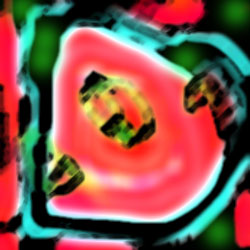|
|
Margaret Cavendish
Of small Creatures, such as we call Fairies. Who knows, but in the Brain may dwell Little small Fairies; who can tell? And by their several actions they may make Those forms and figures, we for fancy take. And when we sleep, those Visions, dreams we call, By their industry may be raised all; And all the objects, which through senses get, Within the Brain they may in order set. And some pack up, as Merchants do each thing, Which out sometimes may to the Memory bring. Thus, besides our own imaginations, Fairies in our brain beget inventions. If so, the eye's the sea they traffic in, And on salt watery tears their ship doth swim. But if a tear doth break, as it doth fall, Or wiped away, they may a shipwreck call. When from the stomach vapours do arise, Fly up into the Head (as to the skies) And as storms use, their houses down may blow, Which, by their fall, the Head may dizzy grow. And when those houses they build up again, With knocking hard they put the Head to pain. When they dig deep, perchance the Tooth may ache, And from a Tooth a Quarry-bone may take; Which like to stone, may build their house withal: If much took out, the tooth may rotten fall. Those that dwell near the ears are very cool, For they are both the South and Northern Pole. The eyes the Sun and Moon, which give them light, When open, day, when shut, it is dark night. The Fairies in the Brain, may be the causes of many thoughts. When we have pious thoughts, and think of heaven, Yet go about, not ask to be forgiven, Perchance they're preaching, or a Chapter saying, Or on their knees devoutly they are praying. When we are sad, and know no reason why, Perchance it is, because some there do die. And some place in the Head is hung with black, Which makes us dull, yet know not what we lack. Our fancies, which in verse, or prose we put, Are Pictures which they draw, or Figures cut, And when those fancies are both fine, and thin, Then they engraven are in seal, or ring. When we have cross opinions in the mind, They in the Schools disputing we shall find. When we of childish toys do think upon, A Fayre may be whereto those people throng, And in those stalls may all such knacks be sold, As Bells and Rattles, or bracelets of Gold. Or Pins, Pipes, Whistles are to be brought there, And thus within our Head may be a Fayre. When that our brains with amorous thoughts doth run, Are marrying there a Bride with her Bride-groom. And when our thoughts are merry, humours gay, Then they are dancing on their Wedding-day. Sir Charles into my chamber coming in, When I was writing of my Fairy Queen; I pray, said he, when Queen Mab you do see, Present my service to her Majesty: And tell her, I have heard Fame's loud report, Both of her Beauty, and her stately Court. When I Queen Mab within my Fancy viewed, My Thoughts bowed low, fearing I should be rude, Kissing her Garment thin, which Fancy made, Kneeling upon a Thought, like one that prayed In whispers soft I did present His humble service, which in mirth was sent. Thus by imagination I have been In Fairy Court, and seen the Fairy Queen. For why, imagination runs about In every place, yet none can trace it out. Margaret Lucas Cavendish (1623-1673) published 'Poems, and Fancies' in 1653, followed by a prolific output of poetry and prose, including 'The Blazing World', a strange merging of magical realism and science fiction. Unusually for the time, she was enthusiastically supported by her husband, William Cavendish, first Duke of Newcastle (1593-1676), who wrote, 'I saw your Poems, and then wish'd them mine'. Mutual admiration was a feature of their marriage, along with unblushing self-promotion, summed up in her declaration that, 'I have an Opinion, which troubles me like a conscience, that 'tis a part of Honour to aspire towards a Fame'. 'Poems, and Fancies', is dedicated to Sir Charles Cavendish, Margaret's brother-in-law and loyal friend. In teasing her about her poem to 'Queen Mab', he was using a traditional English name for the fairy queen. Elaine Walker has lightly edited these extracts from the first edition of 'Poems, and Fancies' (1653). Archaic language and capitalisation are unaltered, but the spelling has been modernized for clarity and some minor adjustments made to the punctuation.
About the author
Elaine Walker's magical realism novel, 'The Horses', is forthcoming from Cinnamon Press in 2010. Her current book, a cultural history coincidentally called 'Horse', is published by Reaktion Books (2008). |
|


 From 'Poems, and Fancies', Margaret Cavendish, 1653
From 'Poems, and Fancies', Margaret Cavendish, 1653